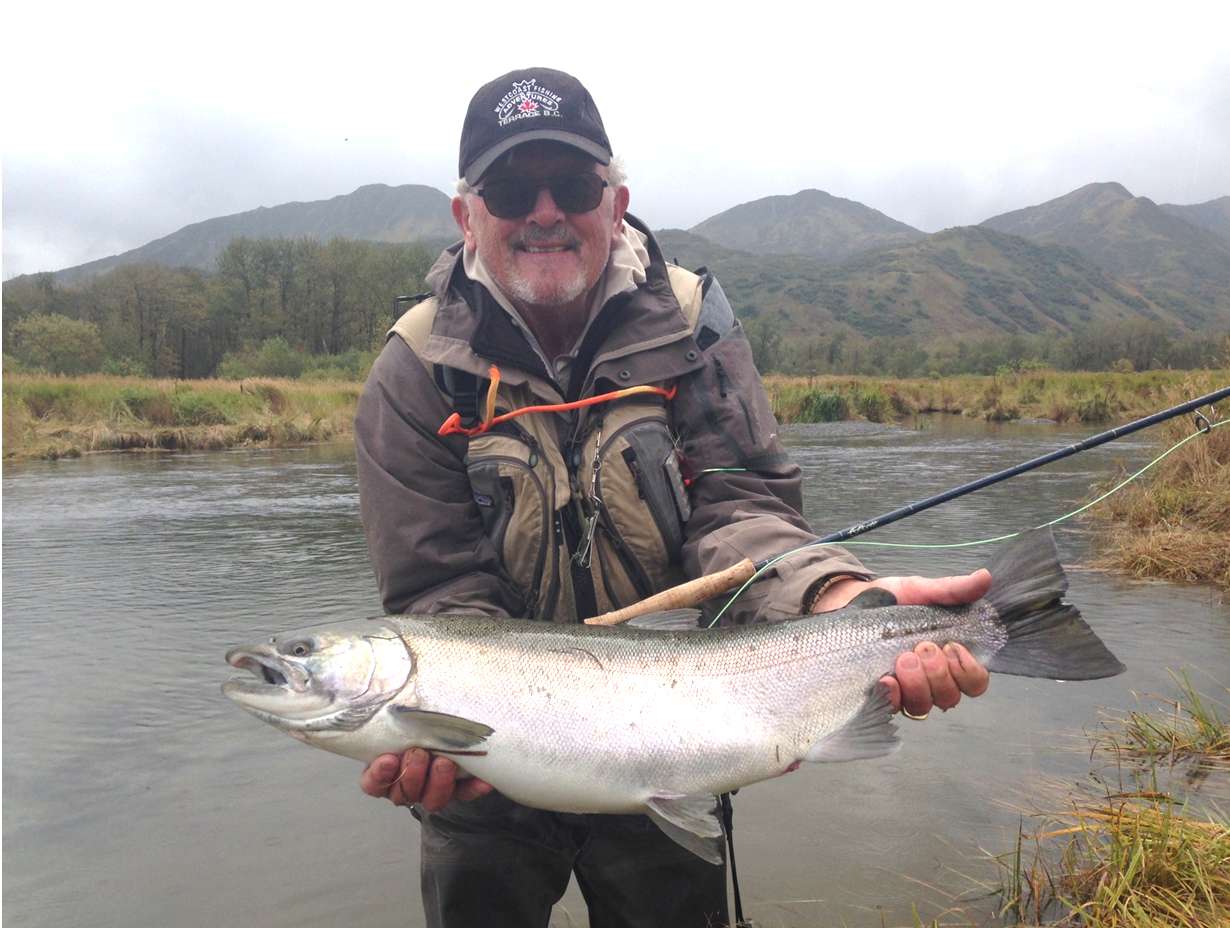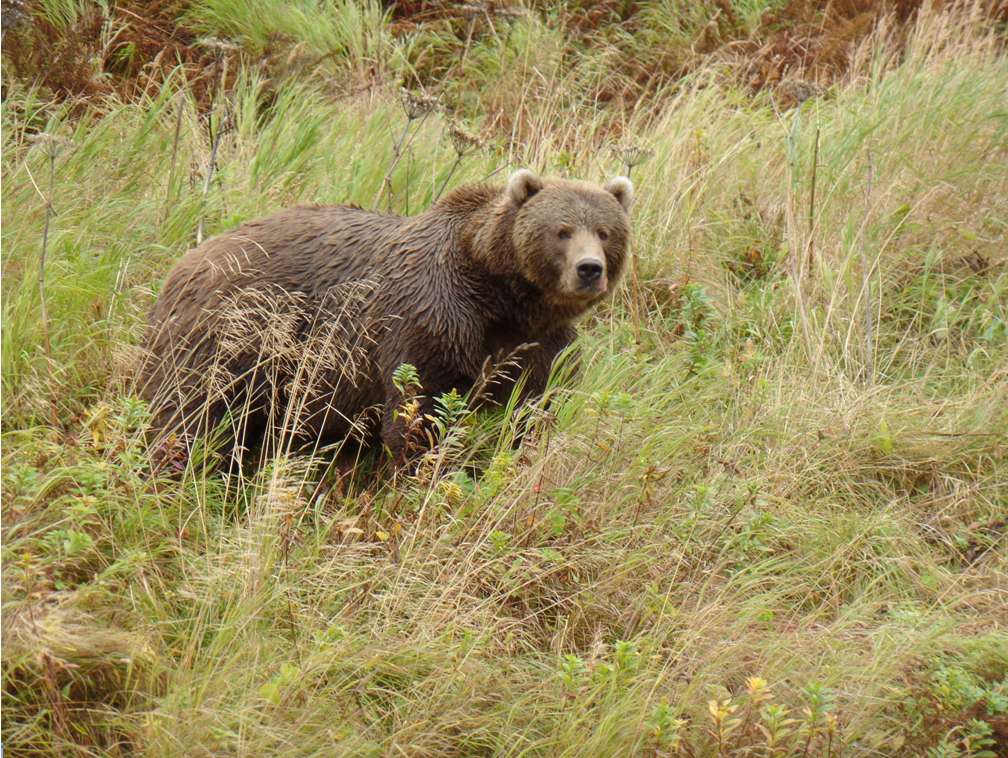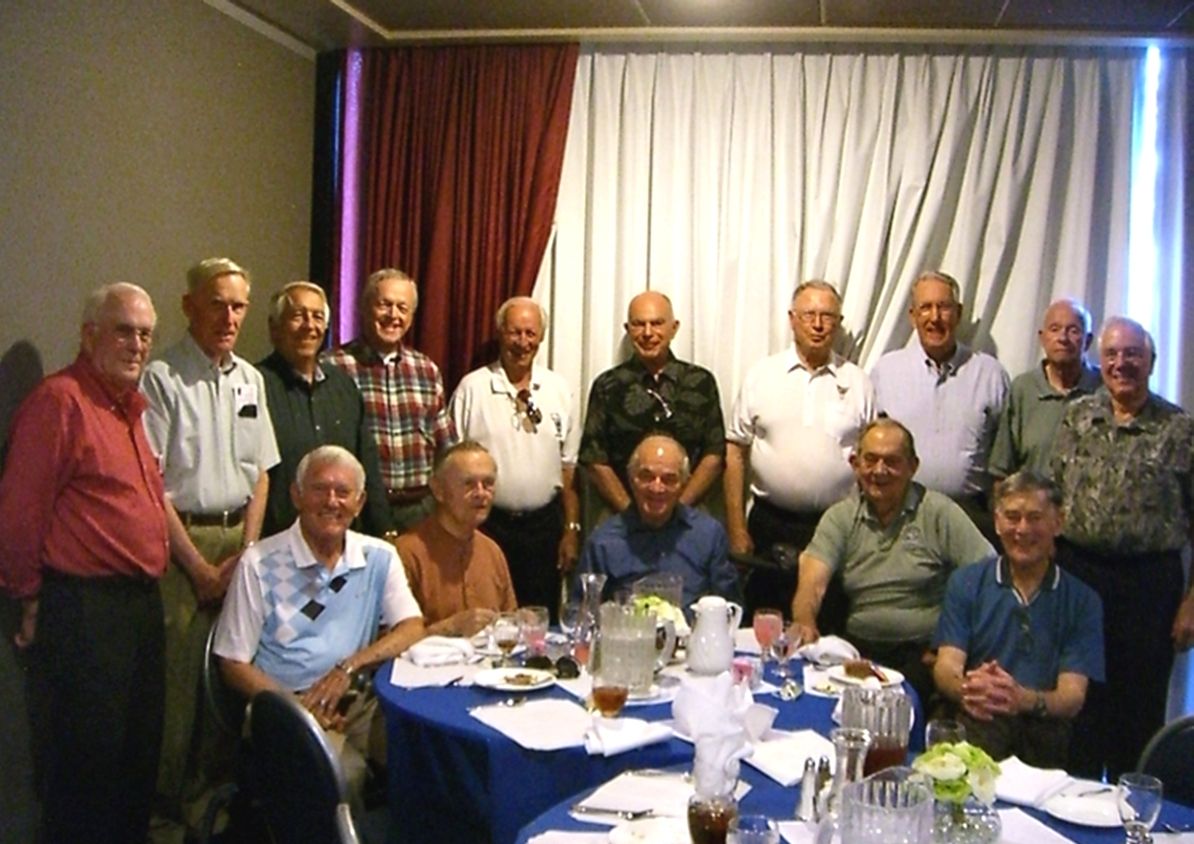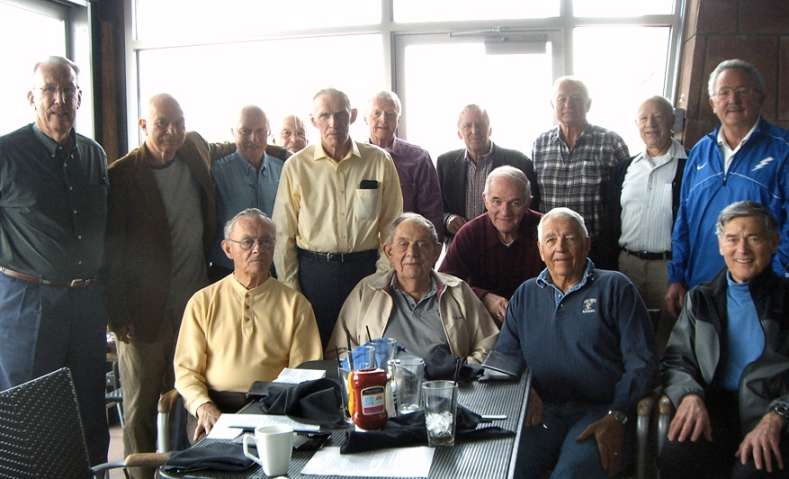16 September 2015
Class of '60 Lunch
On 16 September, the Colorado Springs Bunch strolled our way into the Falcon Club at the Academy for lunch and our monthly updates. In attendance were: Andi Biancur, Tony Bilello, Jim Bujalski, Jim Glaza, Wayne Kendall, John McCullough, Bruce Mosier, George Pupich, Fred Porter, Pete Roe, Gordon Savage, Dick Schehr, Jock Schwank, Jim Waddle, Denis Walsh, and Ron Yates.
Over the past couple of years, at each lunch meeting, one of our classmates has taken the stage to tell us stories of his life. This month, it was John McCullough’s turn. And as most of you know, John has spent a significant amount of time and energy to become one of the most accomplished amateur fly fishermen in the world. He has fly fished in both fresh and salt waters in South and Central America, Russia, Northern Canada, Hawaii, Christmas Island, The Seychelles, Alaska, throughout the states, and just about everywhere you or I can think of. He has landed more trophy fish of different species than I could name, and worked his way into some of the remotest locations imaginable.
The telling of his experiences is spell-binding and, to tell the truth, takes the listeners on almost visible virtual adventures. The photo below is just one of John’s triumphs over a Pacific Silver Salmon he took from the Ayakulik River on Kodiak Island, Alaska.

Under the watchful eye of this Kodiak Brown Bear – the largest land carnivore in the world.

17 June 2015
Class of '60 Lunch
On 17 June the group gathered at the Falcon Club (Formally simply known as the O-Club) for our monthly lunch get-together. Of the local class contingent of 20, only 5 were devious enough to come up with excuses not to attend.

Rear: Fred Porter, Dick Sexton, Andi Biancur, Wayne Kendall, Jim Glaza, Jack Brush, Dick Schehr, Jim Waddle, Denis Walsh, Jim Bujalski.
After the usual greetings, food, and bull session, Wayne Kendall, introduced Tom Berry, '71, Deputy Director of the Center for Character & Leadership Development (CCLD) who brought us up-to-date on the current Honor Code. As you can imagine his informal presentation became quite technical and far too complex to attempt to summarize. Tom graciously responded to every question as he briefly described how the code has aged over the years since we experienced it. He briefly outlined the genesis of the current Honor Oath now taken by all Doolies near the end of the first summer.
Throughout the 4-year stay at the Academy, each cadet undergoes 165 hours of honor and ethics training--equates to 1.0 hrs./cadet/wk. Much of this is administered by cadets with some direct or indirect mentoring by officers and NCOs.
He outlined the current process initiated when a violation arises, and the different tracks employed when a violation is self-admitted or suspected. Simply put; if an individual self-admits to a violation in a timely fashion, he or she enters a fairly lengthy process beginning with a 3-man Sanctions Recommendation Panel consisting of a squadron, group, and wing honor reps who provide recommendations of anything from 3-month rehabilitation up to disenrollment. Depending on their determination of the severity of the offense, their recommendation goes forward to various levels for review and action. Each progressive level of severity involves greater sanctions.
If the individual is accused and does not self-admit, the case goes directly to the Wing Honor Board for full investigation and action. Generally the result of that process is either not guilty, in which case all records are immediately destroyed and the cadet returns in full standing. If found guilty, the case is forwarded through the regular dis-enrollment process. (The power to dis-enroll is solely vested in the Superintendent. It goes no higher in the Air Force system.) The only delay in the process is ensuring the legalities of the action and assessing the punishment--does the cadet owe service or monetary recompense? (a recommendation which does go to SecAF).
We were encouraged to hear that dis-enrollmentcontinues to be the presumptive punishment. The basic difference being that self-admission opens the possibility of other less serious punishment of various forms of probation which is seen to have both punitive and rehabilitative aspects. And, time under the code is a significant determiner as to the punishment meted out. The longer one lives under the code the tougher the sanctions.
Over the last 10-15 years, The Wing has dealt with an average of 150 honor cases per year. And, Tom gave us all a more confident feeling that the cadet wing is still in complete charge, and the code, as we knew it, is still basically in place and operating as we knew it.
After an hour in the hot seat, Tom had to excuse himself with the promise that he would be happy to return to continue the discussion.
20 May 2015
Class of '60 Lunch
Under the professional guidance of "Super Doc" Wayne Kendall, most of the Colorado contingent of the Class met at the Academy Officers' Club (now known as the All Ranks Falcon Club) for our monthly lunch get-together. Able to make it through the gates under the enhanced security conditions were: Wayne Kendall, Denis Walsh, George Pupich, Jim Glaza, Jim Bujalski, John McCullough, Dick Sexton, Jim Waddle, Gordy Savage, Dick Schehr, Jock Schwank, Fred Porter, Andi Biancur, and Bruce Mosier. Following a buffet lunch, we were treated to a briefing of the early B-2 story by Fred Porter’s friend Rick Couch. Rick, along with Bruce Hinds ’61, was an original test pilot for the program and conducted the first flight and all other early flight testing.
Our next get-together is scheduled on June 17th at the O Club featuring a discussion on the present Cadet Honor Code with Tom Berry from the Center for Character & Leadership Development (CCLD). Knowing the local attitudes, that session may be livelier than is healthy for a group our age.
15 April 2015
Class of '60 Lunch
The local contingent of the class again met at the Rocky Mountain Brewery for our monthly lunch on 15 April. After commiserating over the annual impact of the IRS, we got down to some serious social interchange. One of the best attended gatherings to date, all 17 attendees retreated to the usual stories and antidotes. Tony Bilello, Dick Schehr, Denis Walsh, Dick Sexton, Gordy Savage, Bruce Mosier, Andi Biancur, Jim Glaza, John McCullough, Dave Reed, Bill Hodson, Jim Waddle, George Pupich, Pete Roe, Fred Porter, Jim Bujalski, and Wayne Kendall responded to role call with only Ron Yates, Jock Schwank and Jack Brush absent. Whenever we gather with food involved, we always set one vacant place in case Deke were to show up.
Following a report from Dick Sexton on the most recent class senate meeting, and a few assorted general announcements, Gordy Savage followed our established procedure of sharing a re-cap of his Air Force career and life after in the real world. Gordy, an accomplished speaker and author describes feeling somewhat like a "Round peg in a square hole." Regardless, Gordy had a very productive career after which he became a "gentleman rancher" and published author – mostly of science fiction. He is now completing his second novel with some ideas as to his next effort.
We have found it neat and interesting to hear different life stories and accomplishments of classmates we have known for so long, and, in most cases, we had no idea.
Before we departed, our organizer and host, Wayne informed us we would be moving to the Academy All Ranks Club (previously O-Club) for our summer meetings to be kicked off on 20 May with a presentation by one of the original test pilots on the B-2, compliments of a friend of Fred Porter, our resident aeronautical engineer.
